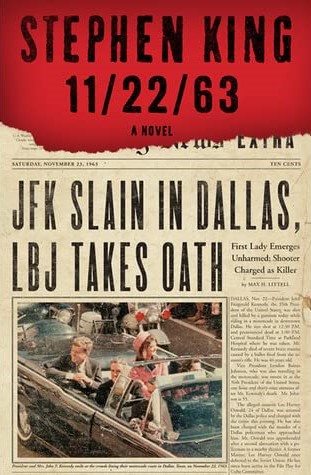 By STEPHEN KING (Scribner; 2011)
By STEPHEN KING (Scribner; 2011)
A surprise: I admittedly had little hope for this Stephen King 842-page time travel opus, yet it turns out to be King’s finest novel in decades. Indeed, it may well be the most sheerly enjoyable novel King has ever written, being in the same league with time travel classics like Jack Finney’s TIME AND AGAIN and Ken Grimwood’s REPLAY. In a lengthy afterward King admits he was heavily influenced by the former novel, and even considered dedicating this book to Jack Finney, which seems entirely appropriate.
The overall concept is simple enough: Jake Epping, a 35-year-old Maine-based English teacher, is encouraged by Al, a local fry cook, to travel back in time to prevent the assassination of John F. Kennedy. It just so happens that there’s a time portal in the backroom of Al’s diner that leads back to the year 1958. Long story short: Jake makes the attempt. Before doing so, however, Jake decides to prevent another past tragedy involving an adult student whose father took a hammer to his family, which conveniently occurred in 1958.
The latter plot strand takes up much of the opening third, which sees Jake settling in the fictional town of Derry, Maine. Readers of King’s IT will recognize the time and place, wherein Jake actually meets two of IT’s child protagonists.
Following this Jake makes his way to Texas, where Lee Henry Oswald will allegedly shoot JFK from a Dallas book depository on November 22, 1963. Neither Jake or his mentor Al are entirely sure Oswald is the shooter, or if so whether he acted alone, meaning Jake has to wait and observe Oswald’s movements by laying low in a house across the street from Oswald’s. In the meantime Jake falls in love and finds fulfillment in early-1960s Texas by working as a teacher in the friendly town of Jodie, which complicates his quest immeasurably.
That’s all I’ll reveal of this epic narrative (of which I’ve probably given away too much). As with any great yarn, 11/22/63’s pleasures are in its consistently unpredictability which never takes an expected turn and keeps us on edge throughout. The lead character is likeable enough that it’s impossibly not to root for him, and his time-tripping exploits are absorbing and consistently suspenseful.
King has stepped outside his comfort zone here to agreeable effect. He also rigorously follows the laws of time travel in his tale, even if it ultimately doesn’t add much to the sub-genre. Its underlying message, that one shouldn’t fuck around with the time-stream due to the so-called Butterfly Effect, isn’t exactly novel, having been effectively elucidated back in Ray Bradbury’s 1952 tale “A Sound of Thunder” (in which a man travels back in time and steps on a butterfly, the consequences of which irredeemably change the course of history).
Again, though, 11/22/63’s pleasures are in its unerringly enjoyable narrative, which nicely blends nostalgia, romance and horror. Its portrait of late 1950s-early 1960s America is vivid and atmospheric, and the novel furthermore contains one of King’s most satisfying endings (with which his novelist son Joe Hill admittedly helped out) in some time.
